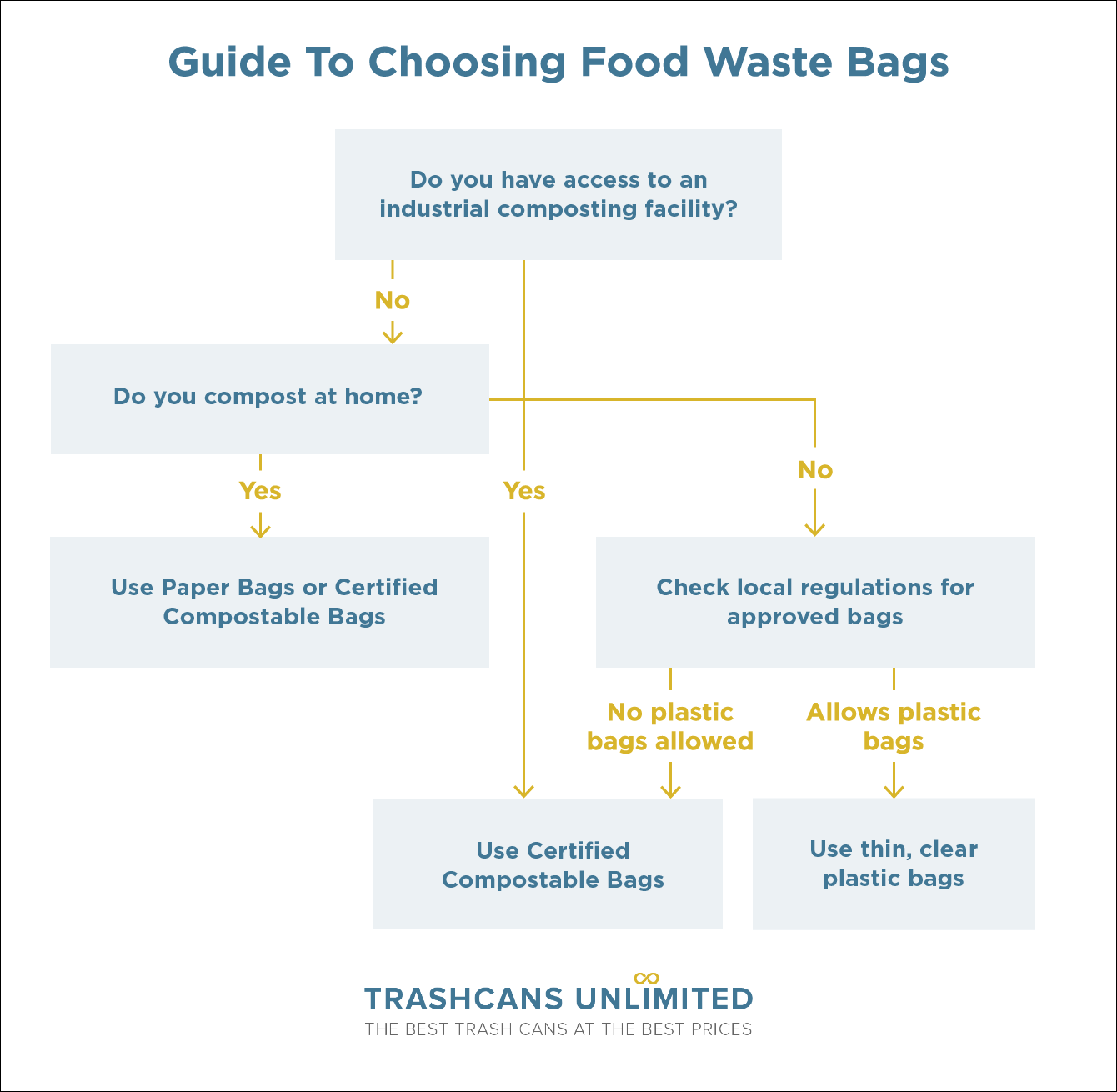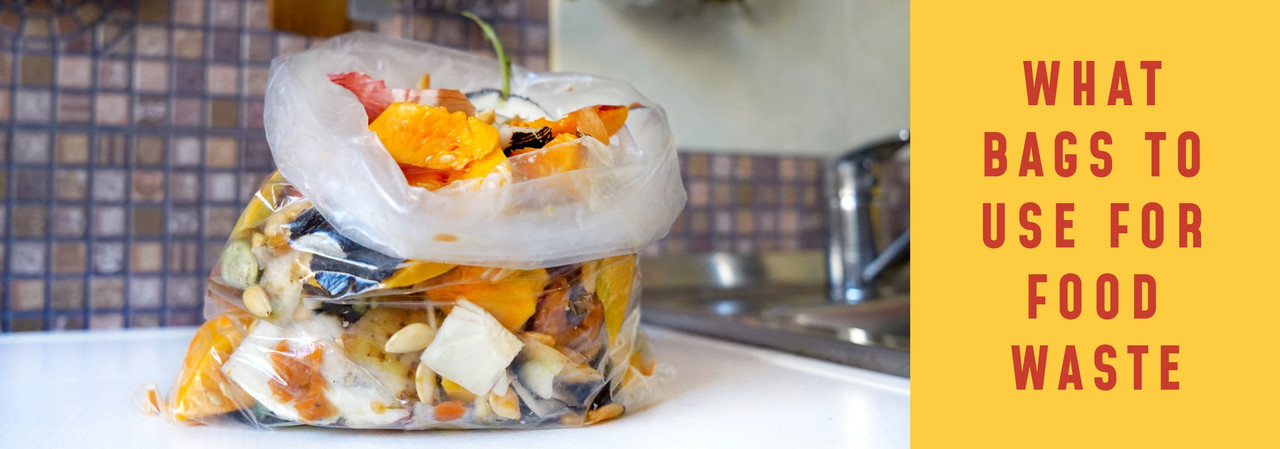Imagine a world where a simple change in your daily routine—choosing the right food waste bag—helps reduce these harmful emissions and supports sustainable waste practices. Whether you compost at home or rely on municipal programs, your choice of bag can impact our environment.
Every year, millions of tons of food end up in landfills—food that could nourish our gardens, our communities, and even our future. Research by the United Nations Environment Programme estimates that food waste accounts for roughly 8–10% of global greenhouse gas emissions due to methane release.
Many environmentally conscious individuals worry about the fate of their discarded food scraps, uncertain which bag option truly contributes to a cleaner planet. This article takes an in‐depth look at what bags to use for food waste, exploring the various types of bags available for food waste disposal, and guides you through the benefits and drawbacks of each option.
By understanding what bags to use for food waste, you can make informed decisions that align with sustainability goals while ensuring proper decomposition and waste management.
Key Takeaways
-
Certified compostable bags are the most sustainable option for food waste collection.
-
Paper bags can work if approved by your local waste management authority.
-
Always check regional guidelines to ensure compliance with acceptable bag materials.
What Bags to Use for Food Waste? A Comparison of Food Waste Bag Options
When it comes to managing food waste, what bags to use for food waste is a key consideration that impacts both convenience and environmental sustainability. Let’s examine the options available, their ecological footprints, and how they align with various disposal methods.
Certified Compostable Bags
Certified compostable bags are designed to break down rapidly in industrial composting facilities. They are made entirely from plant-based materials, such as cornstarch, and meet rigorous standards like ASTM D6400 in the United States or EN 13432 in Europe. These standards require that the bag decompose completely—typically within 180 days—without leaving harmful residues behind.
Products with certifications from recognized bodies such as the Biodegradable Products Institute (BPI) give you confidence that your bag will convert into nutrient-rich compost rather than contributing to landfill pollution or microplastic contamination. In many municipalities, certified compostable bags are preferred because they integrate seamlessly with existing composting programs, helping to transform food scraps into valuable organic fertilizer.
Biodegradable vs. Compostable Bags
While the terms “biodegradable” and “compostable” are sometimes used interchangeably, they are not the same. Here’s a quick comparison:
| Feature | Biodegradable Bags | Compostable Bags |
| Material | May include plastics | Fully plant-based |
| Breakdown | Takes years, incomplete | Fully decomposes in 180 days |
| End Product | Potential residues | Nutrient-rich compost |
| Certification | No standard | ASTM D6400, EN 13432 |
Choosing what bags to use for food waste is essential for proper composting and waste management. Opting for compostable bags ensures your food waste is transformed into healthy compost rather than lingering pollutants. You can feel confident in your choice when you see clear labeling with certification marks.
Plastic Bags in Food Waste Bins
In some regions, local regulations permit certain plastic bags in food waste bins to encourage broader participation in organic waste programs. Typically, thin and clear plastic bags are sometimes mechanically removed from food waste at processing facilities. However, they are generally not recommended as the ideal choice.
Plastic bags may not fully degrade under composting conditions and can interfere with the composting process by contaminating the organic matter. If you must use plastic bags due to local guidelines or convenience, opt for the thinnest, clearest options to help processing facilities remove them more efficiently.

Choosing the Right Bag for Your Needs
Your selection of what bags to use for food waste should depend on your specific waste management practices—whether you’re composting at home or participating in a municipal food waste collection program.
Home Composting
For those who compost at home, both paper bags and certified compostable bags offer practical options. Paper bags are:
-
Inexpensive and widely available.
-
Fully biodegradable and break down readily in backyard compost piles.
On the other hand, certified compostable bags, though sometimes a bit more expensive, provide excellent moisture resistance and help contain odors, making them ideal for kitchens. To boost your composting efficiency:
-
Line your kitchen compost bin with newspaper or a paper bag to help manage moisture and odors.
-
Consider a sealed outdoor compost bin that deters pests and maintains proper aeration for larger quantities of waste.
-
Layer green food scraps with brown materials (like dry leaves) to balance the compost mixture.
Municipal Waste Collection
Local authorities often specify which bag types are acceptable if you participate in municipal waste collection programs. Commonly approved options include:
-
Kraft paper bags
-
Certified compostable bags
-
Newspaper wrapping
Many municipalities even offer free compostable bags to encourage residents to join food waste collection efforts. Follow local guidelines carefully, as using non-approved plastic bags may disrupt the composting process or lead to fines.
Environmental Impact Considerations
When choosing what bags to use for food waste, it’s vital to consider their overall environmental footprint. Here’s how various options compare:
| Bag Type | Advantages | Drawbacks |
| Paper | Biodegradable, widely accepted | High resource use in production |
| Compostable Plastic | Breaks down in facilities | Requires industrial composting |
| Reusable Containers | Zero waste option | Needs regular cleaning |
Reusable containers, where feasible, are the most sustainable option. They eliminate the need for single-use bags and can be emptied directly into compost bins or collection points. You can minimize your ecological impact by rethinking your waste practices while maximizing resource efficiency.
Practical Tips for Reducing Waste
Beyond choosing what bags to use for food waste, adopting mindful waste-reduction practices can amplify your efforts. Let’s explore ways to minimize food waste and segregate trash more effectively.
Reducing Food Waste
Smart Meal Planning: Prepare a shopping list before heading to the store and stick to it. This helps avoid over-purchasing and minimizes waste.
Refrigerator Organization: Arrange your fridge so perishable items are visible and used before expiration. Consider using clear storage containers and labels.
Creative Cooking: Use leftovers creatively. Turn vegetable scraps into broth or blend overripe fruits into smoothies. Small adjustments in your cooking habits can significantly reduce waste.
Portion Control: Consider serving smaller portions when dining out or serving food at home. This not only reduces waste but can also help with healthier eating habits.
Proper Waste Segregation
Designated Bins: Set up labeled bins for recyclables, organics, and non-recyclable waste. This ensures that materials are directed to the correct processing streams.
Rinse Recyclables: Always rinse containers before disposal. This practice prevents contamination and improves the efficiency of recycling operations.
Bag Selection: Use certified compostable or paper bags to contain mess and odors for organic waste. If you must use plastic, check local guidelines to ensure they are acceptable.
Stay Informed: Regularly review local recycling rules and guidelines to stay updated on acceptable materials. Many regions update their regulations as technology and practices evolve.
Sustainable Waste Practices
Every small choice matters when it comes to sustainability. Using certified compostable bags for food waste helps the environment and supports efficient waste management systems.
Beyond choosing what bags to use for food waste, consider broader waste reduction strategies. Reusable containers, composting, and conscious shopping habits contribute to a cleaner planet. Even simple acts like bringing your own bag to the store can make a meaningful difference.
By rethinking how we handle food waste, we can all create a more sustainable future—one choice at a time. Together, these efforts can lead to cleaner communities and a healthier planet for future generations.
Upgrade Your Waste Management with Trashcans Unlimited
Now that you’re ready to take control of your food waste with the right bags and practices, it's important to know what bags to use for food waste to ensure an efficient and environmentally responsible system. Why not complement your efforts with high-quality waste management solutions?
Trashcans Unlimited offers various indoor and outdoor trash cans, recycling bins, and specialized containers to support effective waste segregation and composting systems. Our products are engineered for durability and ease of use—making them the perfect addition to any sustainable waste management setup.
Visit Trashcans Unlimited today to explore their comprehensive selection of commercial and residential trash cans.

